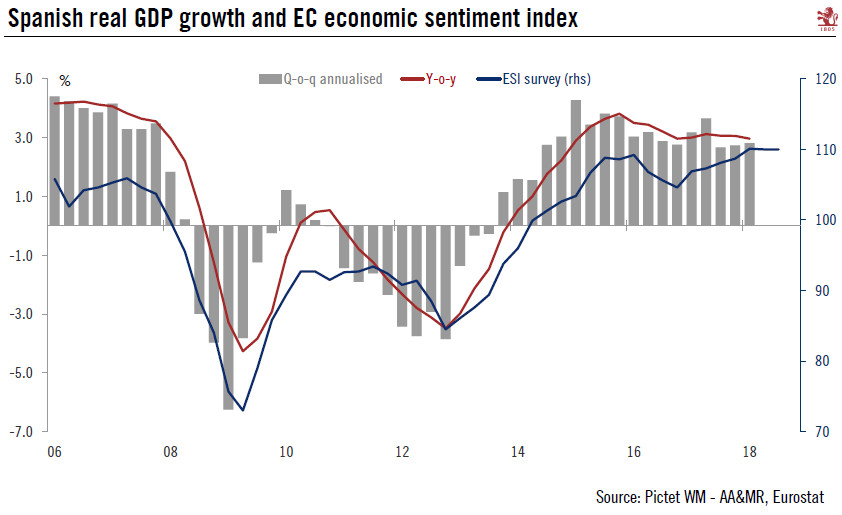Amid domestic political uncertainty, Spanish growth remains strong. This week saw the final release of Spanish GDP growth for Q1. The economy again managed to post robust growth, the highest among the four largest euro area economies (+0.7% q-o-q versus 0.4% q-o-q for the euro area). The breakdown of figures showed that domestic demand was once again the main growth driver. The carryover effect for 2018 reached 2.8%, meaning that even with zero growth in the remaining three quarters of 2018, Spanish GDP would grow by 2.8% on average this year. Leading indicators, such as the European Commission’s economic sentiment index, point to broadly strong growth in Q2 (see chart), helping offset domestic political instability.
Topics:
Nadia Gharbi considers the following as important: 2) Swiss and European Macro, Featured, Macroview, newsletter, Pictet Macro Analysis, Spain Gross Domestic Product
This could be interesting, too:
Nachrichten Ticker - www.finanzen.ch writes Die Performance der Kryptowährungen in KW 9: Das hat sich bei Bitcoin, Ether & Co. getan
Nachrichten Ticker - www.finanzen.ch writes Wer verbirgt sich hinter der Ethereum-Technologie?
Martin Hartmann writes Eine Analyse nach den Lehren von Milton Friedman
Marc Chandler writes March 2025 Monthly
Amid domestic political uncertainty, Spanish growth remains strong.
This week saw the final release of Spanish GDP growth for Q1. The economy again managed to post robust growth, the highest among the four largest euro area economies (+0.7% q-o-q versus 0.4% q-o-q for the euro area). The breakdown of figures showed that domestic demand was once again the main growth driver. The carryover effect for 2018 reached 2.8%, meaning that even with zero growth in the remaining three quarters of 2018, Spanish GDP would grow by 2.8% on average this year. Leading indicators, such as the European Commission’s economic sentiment index, point to broadly strong growth in Q2 (see chart), helping offset domestic political instability. Indeed, this week, Spanish politics were back in the spotlight.
Mariano Rajoy lost a no-confidence vote in Congress today. As a result, the Socialist leader Pedro Sanchez will become the new prime minister. This is the first time since Spain returned to democracy in 1978 that a prime minister has lost power through a confidence vote.
| Governing will be quite challenging for Sanchez, as the Socialist party (84 seats out of 350) is far from having a majority in parliament. Passing any meaningful legislation will be extremely difficult. Early elections are possible, as mentioned by Sanchez himself, but he will first wait for the situation to stabilise before calling them. To some extent, he has little incentive to hurry elections. Indeed, apart from the centre-right Cuidadanos, which is clearly ahead in polls, no party has a strong incentive to force elections in 2018. |
Spain GDP and EC Economic Sentiment Index, 2006 - 2018(see more posts on Spain Gross Domestic Product, ) |
Tags: Featured,Macroview,newsletter,Spain Gross Domestic Product

